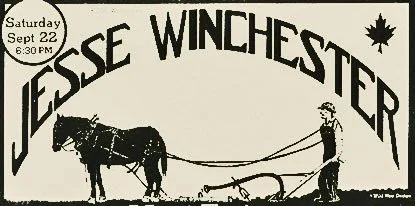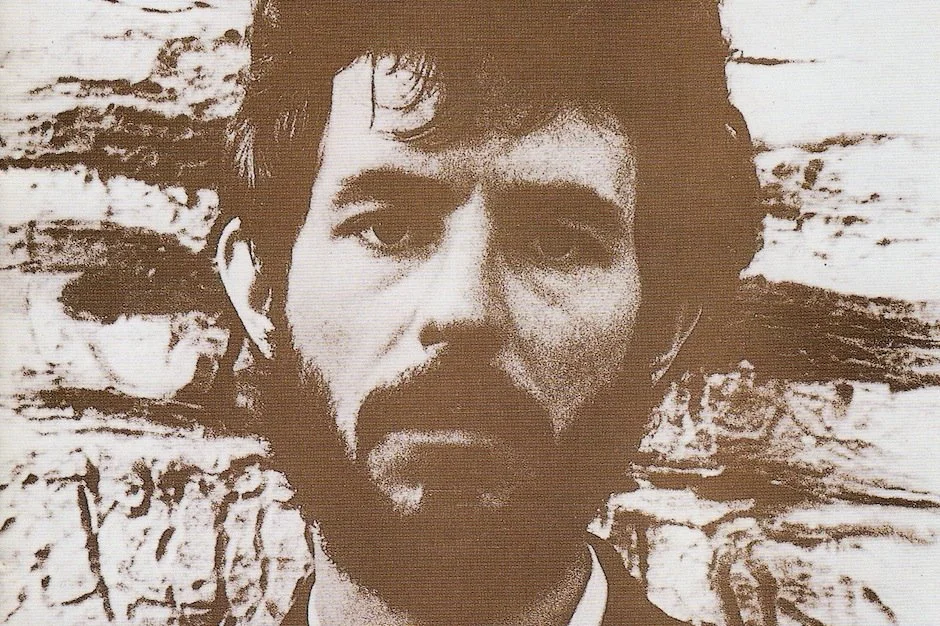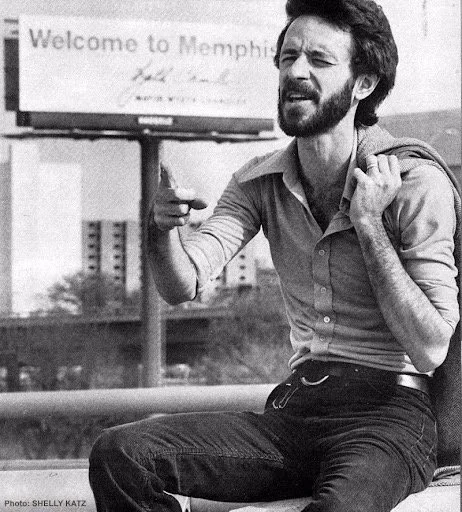Remembering Jesse Winchester - Honorary Montrealer
“Forever.” That’s what Jesse Winchester told the immigration officer when asked how long he would be staying in Canada. Then, all of a sudden there he was, a draft dodging asylum seeker at the Dorval Airport with a guitar in hand. An American political dissenter by the mere virtue of his existence and an as of yet unbeknownst roots music legend. It was January 1967 and Jesse had just arrived from Memphis, Tennessee. He later wrote:
I don't have no heavy hip boots
I don't have no furry hat
I don't have no long-john underwear
No layer of protective fat
He survived that winter, of course, but couldn’t find any meaningful work. As an opus of irony, his accent was off-putting to English employers. This might not be exactly the reason he found himself playing music with French Canadians but it would have certainly helped him understand the plight of Canadian francophones at the time.
Jesse was born in 1944 in Shreveport, Louisiana, a town that 90’s rappers literally dubbed Ratchet City, a town now known for its stray cats and proprietary mutation of pink eye. But at the time it was surely a nicer place to live and yet his family moved as soon as he was born. He spent his formative years in northern Mississippi where his mother taught him piano. Then the family relocated to Memphis in 1956 where his parents bought him his first guitar so he could rock out to Elvis and Fats Domino. Through his teenage years he played in bands with his friends around Memphis, and managed to get himself a scholarship to study music at Williams College in Massachusetts. There he minored in German, and even spent a year abroad in Munich. But every peak precedes a valley and his draft number for Vietnam was called almost immediately after graduation. He was destined to go from music school during the day and bars at night, to boot camp and a meat grinder in the jungle.
Jesse however wasn’t interested in fighting. He understood what the war machine was, and wanted no part of it. His father had fought in the Second World War, and they were descendants of the confederate general Robert E. Lee (historical TLDR: he was an asshole) so we can likely thank the LiBeRaL InDoCtRiNaTiOn he received in the higher education system for his decision to defect. “I was so offended by someone’s coming up to me and presuming to tell me who I should kill and what my life was worth,” he told Frank Rose of Rolling Stone in 1977, the year he was finally allowed to return to America.
Looking back on draft dodgers now, we often think about their contribution to the anti-Vietnam rhetoric which became so prevalent in the United States at the time. But we often gloss over the position they put themselves in. Defecting on your draft ticket was, and still is, a hefty crime in the United States. Hell, Nixon had the national guard mow down protestors at Kent State University in Ohio for merely holding signs about the war. It wasn’t until Jimmy Carter pardoned the lot that they were allowed to return, Jesse would not have qualified for the initial terms of the pardon, but thankfully for him the proposition was ultimately amended and he was able to leave behind the snow.
Well before the pardon, however, he started playing guitar and touring around Quebec with a French band called Les Astronauts. It was in the hotel rooms of tiny Quebec towns like Morin Heights where he composed much of his first self-titled album. When he returned to Montreal he moved to the Mcgill Ghetto, a haven for like-minded compatriots at the time. He continued to play at coffee shops, restaurants, bars and parties throughout eastern Canada, but now had a place to call home. He caught the attention of Robbie Robertson of The Band who produced his first album in 1970. Within a year of its release Joan Baez had recorded a cover of Brand New Tennessee Waltz, and Jesse was becoming a successful songwriter in a land he was banished from. That first album addresses this homesickness and wonder, with a childlike sense of longing he wrote:
The Sun shines on Biloxi
Air is filled with vapors from the sea
The boy will dig a pool beside the ocean
He sees creatures from his dreams underwater
And the Sun will set from off towards New Orleans
(It’s estimated that between twenty and thirty thousand young men, some still boys, fled to Canada expressly to avoid the Vietnam war draft. These men were not seen as refugees or asylum seekers, but rather were able to easily immigrate through regular means. Fucked up, really, when juxtaposed against the current situation of making Palestinian and Ukrainian refugees jump through endless hoops to secure a limited spot in Canada. Unlike the Vietnam war, however, the genocide taking place in Gaza is on the internet instead of television and the ads between coverage are now targeted.)
It’s easy to downplay our involvement in Vietnam, but we were there. Canada was officially in Vietnam to keep the peace, overseeing the passage of ownership from the French to the Vietnamese, and upholding the democratic process to prevent a power vacuum from forming. Ultimately however the situation became untenable, and after a string of Canadian casualties, we pulled out in 1973.
Then Prime Minister Pierre Trudeau took a lot of flak for pulling Canada out of Vietnam and his ensuing peace initiative meant to de-escalate cold war tensions is historically described as ineffectual. Jesse Winchester was a big fan of Pierre Trudeau, and praised him as ‘the poor man's friend’ in the song “Tell Me Why You Like Roosevelt”. Not only did the former Prime Minister support a ceasefire, he openly accepted the draft dodgers and would later joke about keeping them safe from the war in the American media. As a foreign anglophone living in Quebec during the FLQ era, separation could have seen Jesse returned to the United States to face his crime of desertion, a fact that would have been hard to ignore with an accent that stood out like a sore thumb. Though, that didn’t deter Jesse from learning French while in Montreal. As someone who missed the way people spoke back home, he understood the importance of a city's sound. He wrote music in French as well, and while some of the expressions and sounds are inspired by his admiration for New Orleans jazz, it is rife with adoration for our city.
So he wasn’t born in Montreal, only lived here for a relatively short period of his life, retired in Virginia and his favorite city was Memphis. Why on Earth would I suggest he be an Honorary Montrealer you ask? Because of songs such as “Laisse les Bons Temps Rouler” where he describes a party we have all been to:
Tout le monde est dans la cuisine
Il y a du vin fait par ma voisine
He learned to live in Montreal, he learned to love Montreal, just as we all have. Whether you’re born here or not, the harsh winters are an acquired taste and experience we all share, making the summers that much more magical.
When interviewed for a book about the greatest songwriters of all time Bob Dylan said, “Have you talked to Jesse Winchester? You can't talk about the best songwriters and not include him.” This stands as a pretty high compliment from the guy who wrote “Key West Philosopher Pirate”. Jesse didn’t just write haunting melodies in a vacuum, he composed some of the greatest pieces of music of his generation, while living in Montreal. His music parallels and evocates the lyrics behind it. From his youthful melancholy to his romantic vulnerability, each Jesse Winchester masterpiece builds itself for you like a puzzle. A puzzle of jazz chords interlocking R&B rhythm, sprinkled with all the other things he loved about music, and his poignant observations.
Though some of his songs could be considered on the “preachy side”, they never force anything on you other than the urge to dance. The way Jesse wore his heart on his sleeve was commendable. Artists from every discipline should take a page out of Jesse Winchester’s songbook and ‘go where your heart says go’. Recently, Hayes Carll published a fantastic essay about the right of artists to defend their views instead of remaining silent in fear of upsetting fans. Some will still call Jesse a coward because he dodged his duty, but I think he is a hero for giving up his early life in defense of his beliefs, instead of in a field hospital. Like it or not, we as artists are responsible for creating a better world. It is not merely our right to defend our beliefs, it is our duty to stand up for what we believe in. (In our current political landscape, everyone can and should do what they can to make a difference. Even if your contribution is just walking away from a situation you don’t approve of in protest. Remember: evil prevails when good people do nothing.)
Jesse often said that the thing he missed most about his Memphis home while exiled here was the accent, and so it makes sense that his music harkens so deeply to the sounds of the south. They say teleportation doesn’t exist but anyone who has ever been homesick knows that a song, or a painting, or a picturesque poem can send you reeling uncontrollably through the years like a fish on a line. If there is somewhere you want people to go, create something that brings them there. As an added bonus, you can go anytime for free. If the world is what we make of it, then we are all the product of artistic endeavors and labors of love, little more than the plaster that will shape the next generations so let us stay malleable and open to change, just like Jesse Winchester.
Though Jesse never had much commercial success in the United States, he was nominated for several Juno awards, and his final album, A Reasonable Amount of Trouble, saw him nominated for a Grammy just months before his ultimate capitulation to bladder cancer in April of 2014. While he never had a release break the Top 100, he has been covered by legends such as James Taylor, Rosanne Cash, Vince Gill, Emmylou Harris, and Elvis Costello. It has been 10 years now since the world lost Jesse Winchester and it’s safe to say he won't be soon forgotten.
“Forever”, that’s how long Jesse Winchester will be a Montrealer.
Look how the sky's all silver
beautiful Montreal



